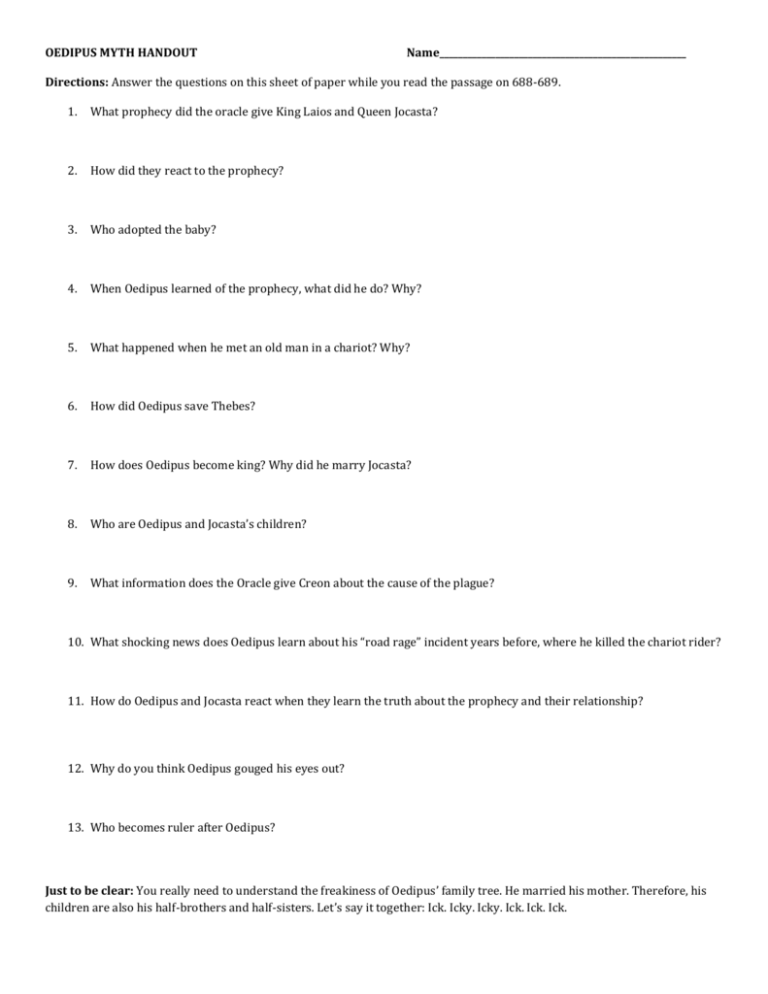OEDIPUS MYTH HANDOUTName
advertisement

OEDIPUS MYTH HANDOUT Name_____________________________________________________ Directions: Answer the questions on this sheet of paper while you read the passage on 688-689. 1. What prophecy did the oracle give King Laios and Queen Jocasta? 2. How did they react to the prophecy? 3. Who adopted the baby? 4. When Oedipus learned of the prophecy, what did he do? Why? 5. What happened when he met an old man in a chariot? Why? 6. How did Oedipus save Thebes? 7. How does Oedipus become king? Why did he marry Jocasta? 8. Who are Oedipus and Jocasta’s children? 9. What information does the Oracle give Creon about the cause of the plague? 10. What shocking news does Oedipus learn about his “road rage” incident years before, where he killed the chariot rider? 11. How do Oedipus and Jocasta react when they learn the truth about the prophecy and their relationship? 12. Why do you think Oedipus gouged his eyes out? 13. Who becomes ruler after Oedipus? Just to be clear: You really need to understand the freakiness of Oedipus’ family tree. He married his mother. Therefore, his children are also his half-brothers and half-sisters. Let’s say it together: Ick. Icky. Icky. Ick. Ick. Ick. ESSENTIAL BACKGROUND INFORMATION What happened just before the play starts Oedipus’ two sons, Polyneices and Etocles were supposed to take turns being the King of Thebes. Etocles goes first, but won’t give up the throne at the end of his term. So, Polyneices goes to Argos and hires an army, then attacks Thebes. In the battle, Polyneices and Etocles kill one another. Creon becomes king, and rules that Polyneices is a traitor and won’t be buried. This is a huge violation of Greek religious beliefs. Their holy laws demand that all people be buried properly, or their souls won’t be able to rest. The conflict in the play revolves around this decision. Creon remains determined that Polyneices remain unburied. Antigone wants to make sure her brother is properly buried. Main characters in Prologue and Parados Polyneices Pol -ee-nee-cees Oedipus’ son. Is dead at the beginning of the story. Considered a traitor by Creon. Etocles Ee-tee-oh-clees Oedipus’ son. Is dead at the beginning of the story. Considered a hero by Creon. Antigone Ann-tig-uh-nee Oedipus’ daughter. Ismene Is-men-ee Oedipus’ daughter. Creon Cre-on King of Thebes Some things about the structure of this play Remember, Greek plays were entertainment AND religious ceremonies. Between the acts of the play, the chorus offers prayers to the gods. These prayers comment on the action in the play, and often ask the gods to take action. This is somewhat different than what we are used to when reading plays. The chorus is a group of people (somewhere between 5 and 10, maybe more). When they speak, they speak in unison. That’s a fancy word for “all together.” Also, the character named “Chroragos” is the leader of the chorus. When he speaks in the play, he represents the voices of the elders of the town. He basically functions as the voice of the townspeople. Again, this is also a bit different. QUESTIONS TO CONSIDER—IN-CLASS WRITING ASSIGNMENT Directions: Each of the five prompts below deals with a major idea in the play Antigone, which we will start reading tomorrow. For each prompt, write a paragraph response of at least two chunks. Your concrete details can be examples from the real world, from books or stories you have read, from movies or TV shows you’ve watched, or from your own experiences. You need to have a clear topic sentence, at least two specific concrete details, and solid commentary. You will need to complete this assignment on your own sheet of paper. This is due at the end of class today. 1. 2. 3. 4. 5. In ancient Greece, many people believed that human beings’ fates were predetermined; in other words, what happens to a person is decided by the gods, and nothing can change that determination. Do you agree with this idea, or do you think we control our own destiny? A popular sayings says “the sins of the father are visited on the son.” This means that when a parent has committed a crime or done something else wrong, that eventually, the children will have to pay for that crime, even though they didn’t actually commit it. Do you agree with this idea? Why or why not? Are there circumstances when it is acceptable to break a law? Why or why not? What is more important: secular (government) laws, or religious beliefs? Under what circumstances would you be willing to risk death to stand up for your beliefs? Why?

